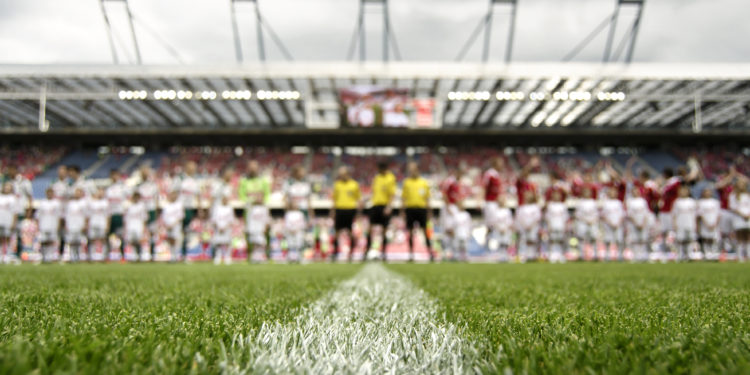12 Sponsorship Mistakes Sports Teams Need to Stop Making

A while ago we talked about how to find sponsors for sports team or sporting event.
Developing a sponsor partnership can be very beneficial for teams. It helps them finance travel costs, equipment and shoulder other investments. At the same time, sponsors benefit from increased exposure and a positive marketing opportunity.
However, finding sports team sponsorship is tough. Doing so requires two parties to align their interests and a lot can go wrong during that process. One mistake and you might lose a sponsorship deal for good.
To avoid this situation, in today’s article we will have a look at common sponsorship mistakes that people make. We will analyze what can go wrong and also look at how situations can be avoided or remedied.
Ready to go? Then what are we waiting for!
Are You Making These Common Sponsorship Mistakes?
Mistakes are a part of life and sometimes can’t be avoided. Yet, that doesn’t mean you can’t try. Knowing what to look out for is half the battle. Therefore, try to stay clear of the following pitfalls when trying to secure corporate sponsorship.
Not Having a Person in Charge

Seeking sponsorship is time intensive and takes a lot of effort. For that reason, it’s usually not a thing that someone can do on the side.
As a consequence, you should definitely appoint someone who takes charge of the entire process of finding a sponsor. Without a point of contact, the whole endeavor runs the danger of being uncoordinated and/or fizzling out.
When you do look for someone in charge, make sure that that person (or persons) actually has time, energy and the ability to make it work. Try not to give it to people who already have enough on their plate, like the head coach. Doing so makes your chances for success much higher.
Making it All About You
In our article about how to get sponsors, we have stressed over and over again that sponsorship is not about begging someone for money but starting a mutually beneficial business relationship.
The keyword here is mutually beneficial. When approaching people for sponsoring you, always focus on what you can do for them, not the other way around.
Remember: For your sponsor this is just another form of advertisement. Advertisement is a business expense and therefore has to compete with other advertising possibilities. For that reason, you need to make a convincing case in order to make the cut.
Stress your sponsor’s benefits, show that you are a good investment to advance their company goals. Make an effort to make it worth their while, otherwise they will think twice about starting or prolonging a partnership with you.
Looking Unprofessional
Of course, to present yourself as a worthwhile investment, you need to look the part. Just like in a job interview, making a good first impression is important to get the gig.
The keyword here is professionalism. Looking professional is a sign of trustworthiness, which is important when you ask someone to invest money in your team. Thus, try to convey it any way possible.
For starters, your sponsorship proposal needs to be meticulous, grammatically correct and spelling error free. Secondly, the person who does the negotiations on your behalf should be able to conduct themselves professionally. That’s the reason why it’s so important to appoint someone capable.
Yet, the need to look professional also extends to everything else you put out there. Anyone who is checking up on you independently should walk away with a good feeling as well.
First and foremost, that means having a professionally designed, up to date and well-maintained website. If yours could use some work, check our article on how to improve your sports team website design.
Aside from that, our free SportsPress plugin is also a great resource to help you create a professional and feature-rich web presence for your sports club.
Article continues below…
Selling Yourself Short
On the other hand, don’t sell yourself short either. You don’t need to be shy about the benefits you have to offer to potential sponsors and the assets you have on your side.
For example, if you have decent follower numbers on your Facebook page, Twitter profile or other social media accounts, a popular blog or otherwise decent traffic on your website — don’t be afraid to throw them in the ring! Whatever benefit you can convincingly demonstrate to your sponsors, you should take advantage of.
Be aware that this isn’t always about the number of people you can reach through your team or event but also about who these people are. If you can provide sponsors with access to a smaller but highly dedicated and targeted audience, that can be worth more to them than sheer numbers.
Good examples for that are people who do Crossfit and MMA. They are well known for being highly loyal to their sports and therefore likely to support organizations that sponsor their sport.
Overall, smaller teams and clubs are often well advised to go for the quality argument instead of quantity when pitching sponsors.
Not Doing Your Research
The best business relationships are those where the goals of both parties align. However, in order to help your sponsors achieve their goals (or propose to do so), it’s important to know what they are in the first place.
Sure, you can send out a cookie cutter sponsorship proposal to a large number of companies, promise them “exposure” in exchange for sponsoring you and hope for the best.
However, bear in mind, many companies want more than mere exposure. They want to build relationships with their clientele, extend their network or achieve some other business goal. Wouldn’t it be better to know about that beforehand?

Apart from that, not every company is suitable as a sponsor for your team, sport or event. Some sponsors’ goals are better aligned with what you have to offer than others and not all of them have the budget for sponsorship or are even interested in doing so.
Therefore, do your due diligence. Find out as much about your potential sponsors as you can so you can better customize your proposal specifically for them (or decide whether to approach them at all).
The best way to do that? Pick up the phone and call someone! That way, you will not only find out who is fit for being pitched, but also who to send your proposal to.
It’s much better to send a tailored proposal to the right person than shotgunning your sponsorship request across the entire department. If you do the latter, more likely than not it will land in the trash.
Being Uncreative with Your Sponsorship Packages
Pretty much anyone can print a logo on their marketing material. For that reason, offering banner space to sponsors is not a very unique proposal. Logo placement is a secondary concern for them, what sponsors really want is to actively engage with customers.
As a consequence, a better idea is to offer more active and creative types of sponsorship. For example, you can propose to actively promote your sponsors on your website and social media channels. Other ideas are to use product placement or give them naming rights to an event.
The trick is to think of ways how sponsors can connect with their audience through you in meaningful ways and then build your sponsorship proposal around it.
Better yet, heed the advice above and talk to your potential sponsors beforehand. Find out what they need and build a custom sponsorship package for their particular goals and needs.
Lacking in Persistence
Seeking sponsorship very firmly puts the ball in your court. Very rarely will someone approach you and propose to support your team or event on their own accord.
In the same line of thought, you can’t just send out proposals and wait for someone to call you back. It is absolutely important that you follow up with your request and do so in a persistent manner.

Especially larger companies often have a lot of gatekeepers for sponsorship seekers in place. For that reason, it’s important to have a bit of backbone and persist until you can get a firm yes or no answer.
Even if a sponsor says no, at least try to get more information about the reason for their decision. That way, you might be able to overcome some of their reservations or at least get information on how to improve your strategy.
At the same time, don’t take this approach too far. If they have already said no to you and have given their reasons, don’t keep badgering them. Be a professional, thank them for their time and let them get on with their lives. You can always try again next year and be better prepared this time.
Not Being Specific
The end goal in seeking sponsorship is to end up with a detailed sponsorship agreement in hand. Note the word detailed. After you have struck a deal, it needs to be crystal clear to both parties who does what, when, where and in which way. Otherwise misunderstandings are inevitable and nothing sours a sponsor relationship quicker than disappointment.
Being specific is also important when you approach sponsors in the first place. Be detailed in what you have to offer and underline your claims with numbers and facts. Good intentions are fine but a weak guarantee. You should be able to back up your pitch with solid figures.
Plus, details are important so that you understand your obligations. Find out how the other party measures the success of your relationship so you know how to make them happy. Only then can you make sure you can deliver what’s expected of you.
And keep a copy of the sponsorship agreement for God’s sake!
Letting Them Control the Negotiation
This next common sponsorship mistake goes hand in hand with being specific and doing your research.
In order to get a good deal, you need to be clear on what you want and can give in return. Otherwise you might be setting yourself up for being controlled and selling yourself out under worth.
While it’s ok to be flexible with your package prices, it’s just as important to know your limits. Coming away with a deal that doesn’t work for you is in nobody’s interest.
First of all, you won’t be happy because you are not getting your needs met. As a consequence, your sponsor probably won’t be happy either when you lack motivation to fulfill your end of the bargain.
It’s a lose-lose situation all around.
Going for One-Year Agreements
As should be obvious by now, procuring corporate sponsorship is hard work. A lot of effort, research and negotiations go into into landing just one sponsorship.
Because of that, many sports teams are happy to go with anyone who is willing to sign with them at all. Even worse, they are ready to accept just about any conditions. Especially in regards to contract length, this can be a grave mistake.
It might come as a surprise, but when looking for a sponsor, your goal should always be to procure a multi-year contract. In fact, a common duration for sponsorship deals is three years.

Why? Well, as you will see below, relationship maintenance with sponsors is hard enough. Add to that the time it takes to procure new sponsors every year and you will quickly see why agreeing with sponsors for several years is more desirable.
Sure, if you think it’s worth it, a one-year agreement can also be acceptable, especially with new sponsors. Both parties can use this time as a trial to see if it’s a good fit for them. However, by default you should always go into the negotiations with the goal of signing for longer than that.
Waiting Until the Last Minute
Negotiations take time and getting to a sponsorship agreement is full of them. For that reason, don’t make the mistake of waiting until the last moment to approach sponsors.
Whether you are looking for a sponsor for next season or an upcoming event, get started as early as possible. This way you have enough time to fine tune your approach and hammer out an agreement.
In addition to that, many organizations have deadlines for sponsorship applications that you don’t want to miss. Even if that is not the case, there is usually a lot of red tape to get through before they approve any sort of financial obligations.
All of the above is also valid for existing sponsorship contracts. When the end of an agreement is at hand, make sure to approach your current sponsors early enough about continuing the relationship.
Check in if they are happy or if there are ways to improve the relationship. In case there are new things to negotiate, you will want to get on that in a timely manner as well. This also brings us to our final point.
Not Nurturing the Relationship
Because of the work involved, it’s usually easier to work on retaining your existing sponsors than looking for new ones.
We can’t stress often enough that the goal of sponsorship is to build long-term relationships. For that to happen, it takes a lot of communication so make sure to keep it open at all times.
Let your sponsors know what you are doing for them, how your event is promoting their business and how you are working to make the sponsorship relationship worth their while. Send proof in form of photos, numbers and feedback.
In fact, do your darndest to show that you are not only honoring your agreement but also working your butt to give them their money’s worth.
This can be as easy as sending a simple monthly email update. If your sponsors feel taken care of and you make the arrangement work for them, why wouldn’t they continue it?
In a Nutshell…
Sponsorship can be a great opportunity for both sports teams and the organizations who sponsor them. The teams get material and financial support while sponsors gain exposure and opportunities to connect with their audience and customers.
However, securing sponsorship is not an easy thing (if it were, you probably wouldn’t have made it to the end of this article) and there are many traps to avoid. By being aware of common sponsorship mistakes, you can do your best to avoid them from the start rather than after you have made them.
On the very basic level, most things come down to a lack of preparation and/or misunderstanding what sponsorship is. Finding a sponsor is not about getting money from other people but creating an opportunity for them and forging long-term relationships that help both parties.
After that, it’s only about coming to an agreement, honoring it and continuing to be a good business partner. If you can do that, nothing should stand in the way of your finding a sponsor.

